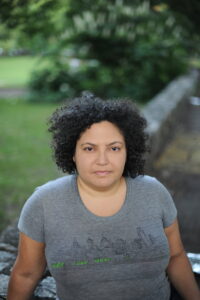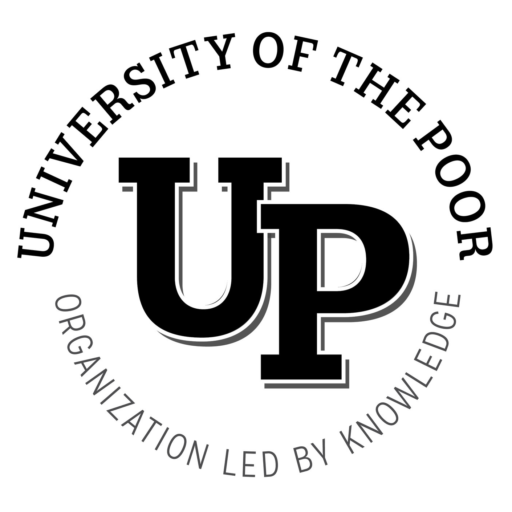By Nijmie Zakkiyyah Dzurinko
Remarks given to the University of the Poor’s inaugural Cadre Course and Organizing Campaign, August 2020
Why do we need the University of the Poor, a cadre organization? I think that we all know that uniting our class is the most difficult thing that we have to do.
To situate myself: I fell into this stuff just through my own life experience. The way that I grew up, the way that I was raised. I just was constantly asking why and trying to figure out what was going on around me. And thankfully, I understood that something happened to the people that were around me: they weren’t that way on purpose, because no one would choose to be that way. So I committed myself from probably the age of five to trying to understand why, just why. I started out just working with young people because of my own experience as a young person. That was what I decided would be the thing to do, because I knew I could understand and relate to what young people are going through.
When I started as an organizer, I didn’t even know what organizing was. And nobody trained me. That was an early lesson in the importance of leadership development: how are we throwing ourselves into a process and trying to develop our people and develop our class when we haven’t been developed? That doesn’t make any sense. It’s not possible. So, that was my early lesson in leadership development.
Over time, I ended up in these places where I was starting or restarting organizations. Through my own political development, a lot of which came through the Poverty Scholars Program, I understood that it was about building vehicles to do this work of uniting our class and identifying and developing and uniting leaders. For me, a lot of my focus has always been about what are the organizational forms that can do that? And how do we create the conditions, inside of this fucked up system, inside of the hegemonic reality that we live in, that we can actually develop revolutionaries out of. The University of the Poor is so important, because we need organizational vehicles at the mass level and at the cadre level to be able to do that.
So I developed these vehicles or started them, and many of them were not able to be secured. And those are the lessons, the experiences that you go through that shape you. These were formations and vehicles that ultimately weren’t really able to be secured for this project of uniting our class and developing leaders. But we keep going, right? We keep going and that’s where Put People First! PA was born out of: these experiences of failure. So when Willie* talks about how he’s made more mistakes than all of us combined, that’s real. That is what forges cadre – actually doing the work and making mistakes and learning from those mistakes and then doing it better.
I just want to say that uniting our class is the most difficult thing. We need to be informed by each other, the lessons coming from other fronts of struggle. And we need to continuously identify, reinforce, study our understanding of the ruling class as a class, and study our class. Just as they study us, we must study them. And we must also study us. And we must also study history.
One of my favorite King quotes is that the true measure of a person is not where they stand in times of comfort and convenience, but in times of challenge and controversy. And that’s what cadre is, right? We can stand in times of challenge and controversy; hold the line; deal with the challenges of helping leaders keep an orientation in the face of crises and uprisings and political police. I would say my conception of cadre is that we do love the people that we are coordinating and developing and because we love them, we are not liberal with them.
I think this is also very important to understand in terms of how we think about and define cadre: the labor that we do in this movement is not the same alienated labor of capitalism. It is the necessary work and the militant work of doing what needs to be done. We are able to face our fears and take on the biggest tasks because we know that we have nothing to lose. We’ve been tested right? And you get tested in building organizations and developing leaders. And we challenge the idea in the society that the only thing that motivates anyone to do anything is money or fear. We absolutely have to get out of that mindset. And that is, to me, what it means to be cadre.
I thank God every day. Living in the society that we live in, dealing with the world of the loyal opposition, I thank God every day for Marx. I thank God every day for Willie. Every single day I say to myself, “God, how did I get so lucky? How did I get so lucky to be in this process?” When I see all of the disillusionment and despair and hopelessness and lack of clarity and fear that consumes our class. And we have a responsibility as cadre to bring people out of that situation. And when we’re in a position to understand what to do to a certain extent, and how to move it forward and how to create the conditions for that to happen – that’s the luckiest, the most amazing thing. That’s the most amazing place to be and I thank God every day for that.
*Willie Baptist, revolutionary and author of It’s Not Enough to be Angry

Nijmie Zakkiyyah Dzurinko is a working class Black, Indigenous and queer organizer, healer and strategist of over 20 years from Pennsylvania. She is co-founder of Put People First! PA, a working class, statewide, base building human rights organization waging a healthcare is a human right campaign.
